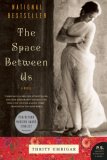Summary | Excerpt | Reading Guide | Reviews | Beyond the book | Read-Alikes | Genres & Themes | Author Bio

A Novel
by Thrity UmrigarSet in modern-day India, The Space Between Us is the story of two compelling and achingly real women: Sera Dubash, an upper-middle-class Parsi housewife and Bhima, a stoic illiterate who has worked in the Dubash household for more than twenty years.
Poignant, evocative, and unforgettable, The Space Between Us is an intimate portrait of a distant yet familiar world. Set in modern-day India, it is the story of two compelling and achingly real women: Sera Dubash, an upper-middle-class Parsi housewife whose opulent surroundings hide the shame and disappointment of her abusive marriage, and Bhima, a stoic illiterate hardened by a life of despair and loss, who has worked in the Dubash household for more than twenty years. A powerful and perceptive literary masterwork, author Thrity Umrigar's extraordinary novel demonstrates how the lives of the rich and poor are intrinsically connected yet vastly removed from each other, and how the strong bonds of womanhood are eternally opposed by the divisions of class and culture.
When The Space Between Us was first released, Umrigar was concerned that Western readers would think of it as a book about a distant "exotic" culture and miss that the themes she draws on are universal. She points out that The Space Between Us is not a novel about caste (Sera Dubash is a Parsi not a Hindu, and the Parsi's do not hold to the caste system) but the more universal system of class divisions - what brings us together and what divides us...continued
Full Review
 (786 words)
(786 words)
(Reviewed by BookBrowse Review Team).
Parsis are Zoroastrians, most likely descended from Persian Zoroastrians who emigrated to Indian from the Middle-East to escape Muslim persecution. Zoroastrianism is both a religion and philosophy based on the teachings of the Iranian prophet Zoroaster (c.1200 BCE) who proclaimed Ahura Mazda to be the one divine authority and creator of all. Zoroastrians pray to Ahura Mazda to help them in the ongoing battle between Spenta Mainyu (the Bounteous Spirit) and Angra Mainyu (the Destructive Spirit). Traditionally, after death the body of a Zoroastrian is laid out naked in a tower to be devoured by vultures, and the soul is judged and passes either to a heaven or hell-like region.
Unlike Christianity, ...

If you liked The Space Between Us, try these:

by Kathryn Stockett
Published 2011
Winner of BookBrowse's 2009 Reader Awards. Three extraordinary women start a movement that forever changes a small town in 1960s Mississippi, and the way women — mothers, daughters, caregivers, friends — view one another. The Help is a timeless and universal story about the lines we abide by, and the ones we don't.

by Thrity Umrigar
Published 2010
Filled with satisfyingly real characters and glowing with local color, The Weight of Heaven is a rare glimpse of a family and a country struggling under pressures beyond their control. Umrigar illuminates how slowly we recover from unforgettable loss, how easily good intentions can turn evil, and how far a person will go to build a new world for ...
When you are growing up there are two institutional places that affect you most powerfully: the church, which ...
Click Here to find out who said this, as well as discovering other famous literary quotes!